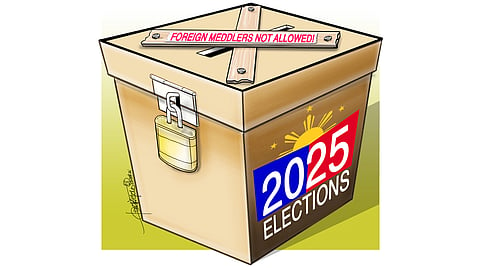
- NEWS
- the EDIT
- COMMENTARY
- BUSINESS
- LIFE
- SHOW
- ACTION
- GLOBAL GOALS
- SNAPS
- DYARYO TIRADA
- MORE

Allegations of foreign intrusion into the electoral system have been circulating among Filipinos since they started electing officials as a commonwealth of a colonial power.
It is a recurring tale woven into the nation’s democratic history. External influence shaped electoral outcomes to serve a powerful nation’s geopolitical interests, exploiting the country’s strategic position and vulnerabilities.
Foreign groups dipping their hands into the country’s elections is made easier by the porous poll system and polarized politics, where money talks.
Complaints of interference in the 2025 midterm elections are not too different from allegations of foreign meddling that have undermined the sovereignty of Filipino voters for centuries.
A third political group from a bloc of nations, purporting to observe the conduct of the elections, warned that the allegations of foreign interference “will be closely monitored if they exist.”
Members of the watchers said, “It is true that over the years, there has been more and more foreign interference in elections, not only here.”
In a strict sense, the group is also composed of interlopers since their presence is not mandated.
The roots of foreign interference can be traced back to the colonial past, when elections were manipulated to ensure compliance with colonial agendas.
A colonial master was notorious for manipulating early 20th-century elections to install pliant elites, ensuring the archipelago remained a reliable outpost for its ambitions in the Asia-Pacific.
For instance, the 1907 Philippine Assembly elections were heavily influenced through oversight, with candidates vetted for their loyalty to colonial governance.
A precedent was thus set in the electoral process, making it a chessboard of foreign powers.
The Cold War era saw suspected interference amplified as the communist influence crept into the region. To counter Soviet-aligned movements, anti-communist candidates were showered with support, financial and otherwise, in the 1950s and 1960s elections.
The 1986 snap election, a pivotal moment in Philippine history, saw overt intervention, maybe not directly through ballots but through diplomatic pressure.
The withdrawal of support for Ferdinand Marcos Sr. amid fraud allegations and mass protests tipped the scales toward Corazon Aquino’s presidency. Political analysts said that while the clear intrusion was peddled as a defense of democracy, it was actually meant to preserve the foreign military bases in the country.
That instance in the country’s history conveyed that the Filipino votes mattered, but these should align with superpower priorities.
Methods have evolved, but the intent remains. The 2022 presidential election, which propelled Ferdinand “Bongbong” Marcos Jr. to power, was notorious for disinformation campaigns, some of which were speculated to have foreign fingerprints.
Recently, allegations of interference, using troll farms, disinformation and alleged payments to local firms have been dominant.
They fit the familiar pattern of a foreign power seeking to sway voters toward agreeable candidates.
The 2023 automated election system bribery scandal, which implicated foreign executives corrupting government contract and the Commission on Elections’ 2024 revelation of a foreign entity’s “direct intervention” via forged documents, depict ways foreign groups infiltrate the democratic process.
The allegations now are being amplified for political gain, raising the specter of foreign interference to rally nationalist fervor or discredit partisan rivals.
However, the focus on one country obscures the historical role of Western powers, which continue to exert influence through alliances and soft power.
Thus, the investigations betray a double standard, where one foreign actor’s meddling is vilified while another’s is normalized.
The country’s democracy can’t be a battleground for global powers since the polls are meant to advance sovereign interests, which usually conflict with those who seek to sabotage the popular will.
Foreign meddling in the elections is not a new scandal but an old wound that reopens with each compromised vote.
